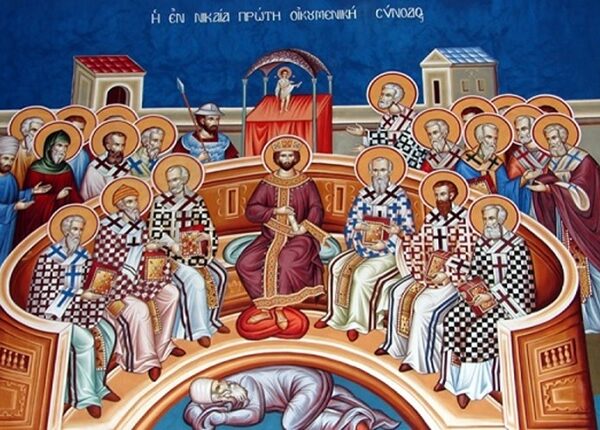The 1st Ecumenical Synod
29 May 2023The first Ecumenical Synod was convened in Nicaea, Bithynia, in the year 325, by Constantine the Great. Efstathios of Antioch, Alexandros of Alexandria and, perhaps, Hosius of Cordoba served as chairmen of the synod.
The dogmatic issue with which this synod dealt was the heresy of Arius. Arius was a presbyter of the Church of Alexandria and had already been condemned by a synod of the Church of Alexandria over his views on the divinity of Christ. Since his heresies had also spread to other ecclesiastical regions of the Roman Empire and were causing problems, Emperor Constantine the Great called the conference in order to resolve the matter.

The fundamental proposition of Arius was that at one time the Son of God didn’t exist. He said: ‘There was a time when he was not’. A corollary of this view was that the Son and Word of God was created, in time. In other words there was a time when the Son of God didn’t exist and therefore: there was a time difference between Father and Son; the Son was not of the same essence as the Father, which meant he was changeable; and he didn’t know the Father. Consequently, the Holy Spirit was created by the Father, through the Son.
Arius began from philosophical views, particularly those of Aristotle, that everything which proceeds from nature is mandated. If the Son was begotten from the nature of the Father, he would, of necessity, be the Son of God, which is why it was said that he was created by the will of the Father. This meant that the Word wouldn’t be God, but a product; the first product of the creation in fact. Moreover, it was a basic tenet of Arius’ that the Son functioned as a lower divinity, who created the human race, but was alien to the essence of the superior Father.
These heretical views created great turmoil among the ranks of the Church. The faithful know Christ from the prophets of the Old Testament, who saw the Word without flesh; from the apostles of the New Testament, who saw the divinity of Christ, the light of God, as did the disciples on Mount Tabor; and from many other events, especially Pentecost. They knew that Christ is truly God, born of the Father before the ages; Light which comes from Light, with the same essence as the Father; and that he knows the Father and has made him manifest to us.
So, the Fathers of the 1st Ecumenical Synod confessed this faith of the prophets and apostles, added the knowledge gained from their own experience, and drew up the first articles of the Creed, which we confess and recite to this day. In particular, it states in the Creed that we believe in one God, the Father, who is the creator of all things visible and invisible. This rules out the view that the creator of the cosmos is a lower God, as the Gnostic philosophers held. Then, the divinity of Christ is confessed, who was begotten from the Father before all ages, with no time separating the Father from the Son. We also declare that Christ is Light, as is the Father, and is of the same essence as the Father; and that the Son of God became a human being for our salvation. Moreover, this first Creed declares that we also believe in the Holy Spirit. Finally those who teach anything contrary to this are anathematized.
Of course, this Creed was completed at the 2nd Ecumenical Synod, but what’s important is that we Orthodox Christians believe absolutely in the divinity of Christ, which has been confirmed for us by those who have seen his glory, his divinity as Light. These are the Prophets, the Apostles, and the Fathers throughout the centuries.
Arius and all the heretics speak of these issues by using philosophy, imagination and reflections, but the Prophets, Apostles and Fathers express the experience they had and confess that Christ is Light, begotten before all ages by the Light and is truly God.
He it is whom we worship, He it is whom we love, and we keep his commandments, so that we can attain to the Light.






